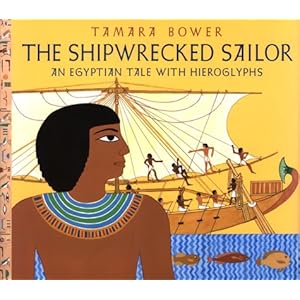For the art projects, we are using Artistic Pursuits, Book 1, one of Cathy Duffy's top 101 picks. For now, we're skipping the first two parts of the book and are concentrating on the chronological ancient art projects in the back of the book. So far we've done "cave paintings," made pottery, and drawn pyramid-style murals. Thursday art days have become a favorite in our house.
In no particular order, I'll share with you some of our library book finds. I'd be embarrassed to tell you how many feet high my stacks of library books measure, but there is no way I can catalog them all for you–at least not in one post. And you wouldn't want me to. So here are few for starters.
The Shipwrecked Sailor: An Egyptian Tale with Hieroglyphs is a beautifully illustrated tale retold from an ancient papyrus scroll believed to date to the nineteenth century B.C. I love that it is an authentic Egyptian story and not historical fiction. There's a place for both but the authentic literature is harder to come by for early ancient history, especially when considering what's appropriate for the younger student. Plus, there are actual hieroglyphic phrases in the illustrations of the book, complete with word-for-word pronunciation and translation!
Seeker of Knowledge: The Man Who Deciphered Egyptian Hieroglyphs is a wonderful picture book biography of Jean-François Champollion. It is well-written and nicely illustrated with lots of interesting information tucked in.
Adventures in Ancient Egypt, a time travel book written and illustrated in comic-book style, was fun for me to read, but I think I'll save reading it to Katherine until we cycle through again. It's appropriately designated for ages eight through twelve.
A City Through Time and A Street Through Time are both excellent pictorial overviews of the history of civilization from nomads through modern times. The detailed illustrations make these over-sized books lots of fun.
I think that's enough for now. Good night!



